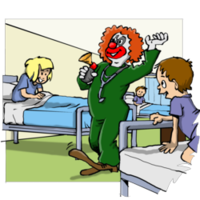Life Is To Be Enjoyed!

“In all of living, have much fun and laughter. Life is to be enjoyed, not just endured.”
–Gordon Bitner Hinckley (American Theologian, and, from 1995-2008, the 15th President of the Church of Jesus Christ of Latter Day Saints, 1910-2008)
Humor and the Treatment of Depression

There is a well-known story about the writer Norman Cousins who claimed to have beaten ankylosing spondylitis by watching Laurel and Hardy and Marx Brothers movies. In his book Anatomy of an Illness as Perceived by the Patient, he chronicles the way in which he laughed his way to health.
In recent years there has been a great deal of interest in the idea of using laughter to prevent and treat mood disorders. We have Laughter Clubs and even Laughter Yoga.
When you first hear about it, the whole idea sounds preposterous: if you are suffering from clinical depression, it is not very likely that you are going to feel like laughing.
So it was very interesting to see some new research (NR46) from colleagues at Cedars-Sinai Medical Center that were presented yesterday at the 2007 Annual Meeting of the American Psychiatric Association in San Diego, California.
Some literature has suggested that humor may help reduce stress and anxiety, but the data has been inconclusive.
The researchers investigated the dispositions toward humor of a group of depressed patients in the outpatient psychiatric department at Cedars-Sinai. Patients were asked to complete a short questionnaire comprised of a regular depression scale as well as Svebak’s Sense-of-Humor Questionnaire.
The researchers had predicted that the level of depression and inherent sense of humor of an individual would determine whether or not they thought that humor would be a viable component of treatment.
In fact there was no correlation with either: depressed people were remarkably receptive to the idea of including humor in their treatment. The researchers are now planning some controlled studies of incorporating humor into the treatment of depressed patients.
Perhaps Patch Adams was right all along!
Wednesday Morning Amusement
Having recently posted about some of the medical benefits of laughter, I thought that I should help disseminate unusual sources for this medical miracle.
So without getting into all the ways in which laughter will affect the amygdala of your brain and improve the elasticicty of you blood vessels, just relax and enjoy these sites:
Laughter is The Best Medicine
“Time spent laughing is time spent with the gods.”
–Japanese Proverb
In the book and movie Anatomy of an Illness, Norman Cousins reported how he overcame a sever arthritic condition with a combination of huge doses of vitamin C, together with a positive mental attitude and hours of laughing at Marx Brothers movies. He wrote that, "I made the joyous discovery that ten minutes of genuine belly laughter had an anesthetic effect and would give me at least two hours of pain-free sleep. When the pain-killing effect of the laughter wore off, we would switch on the motion picture projector again and not infrequently, it would lead to another pain-free interval."
I’ve had a longstanding interest in the vascular endothelium, the single layer of cells that line blood vessels. Some very small blood vessels consist only of endothelial cells. These cells form the interface between the blood and the tissues, and they are involved in many disease processes. They are involved in diabetic vascular disease, arteriosclerosis, inflammation, many infections, and they play a role in the spread of tumors. There is some new evidence that laughter is good for you in more ways than one.
Investigators from University of Maryland School of Medicine found that watching a funny movie had a healthy effect on blood vessel function, allowing them to expand and contract more effectively in response to changes in blood flow. But watching a mentally stressful movie, like a war drama, may have the opposite effect, causing the vascular endothelial cells to narrow and restrict blood flow. On average, artery diameter increased by 22% during laughter and decreased by 35% during mental stress.
This work follows on from earlier research that showed an inverse association between sense of humor and coronary heart disease: people who laughed a lot seemed less likely to suffer form heart disease.
There is a very nice review article available online that confirms what is intuitively obvious humor and laughter may have a positive influence on health and on the outcome of many diseases.
There may be something to the old saying, "You don’t stop laughing because you grow old; You grow old because you stop laughing.”







